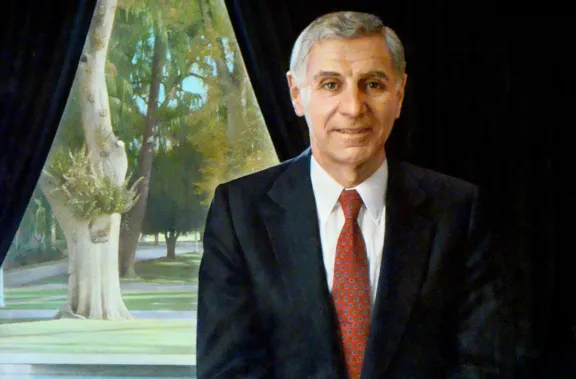
This Date in UCSF History: Mandatory AIDS Testing Criticized
[Originally published in Synapse - The UCSF student newspaper, April 17, 1982] Gov. George Deukmejian and a large media entourage swung through two UCSF labs on April 10 for an update on the state of AIDS research. On the same day, Assemblyman Art Agnos, D-San Francisco, attacked the governor for moving too timidly on the disease, because of its association with homosexuality.
Deukmejian was briefed by a team of AIDS researchers and clinicians, including Dr. Merle Sande, chairman of the UC Systemwide Task Force on AIDS and vice chairman of the UCSF Department of Medicine; Dr. Jay Levy, professor of medicine and one of the first scientists to isolate the AIDS virus; and Dr. Constance Wofsy, co-director of AIDS activities at San Francisco General Hospital.
The researchers and other UCSF officials thanked the governor for his assistance in funding AIDS research and credited state funding as one of the most important reasons for progress in understanding the disease.
“I've been very encouraged by what I've seen today,” Deukmejian said, indicating a realization of the importance of both research and education.
In the past, many scientists have bitterly criticized the governor for cutting the AIDS appropriations designated by the Legislature. There was no discussion at the UCSF event of whether the governor was considering the major increase in state support considered vital by researchers.
“We are opposed to any indiscriminate type of mandatory testing,” for the AIDS virus, Deukmejian said after his lab tour.
The comment was in reference to his controversial endorsement of mandatory tests under certain circumstances, made the previous day.
On April 4, Kenneth Kizer, director of the State Department of Health Services, proposed that the state be empowered to enforce tests on sex offenders and high-risk groups, such as gay men and intravenous drug users, during sudden AIDS outbreaks.
Mandatory tests are not considered necessary or desirable by most AIDS experts in the vast majority of cases.
The governor has stopped short of explicitly endorsing all of Kizer's recommendations. He said mandatory tests would be called for in case of “a clear and present danger” to a large portion of the public, but did not specify what would constitute such a condition.
He specifically endorsed mandatory tests for rapists and “mentally disordered sex offenders.” Deukmejian did not say how those two categories differed. Critics have charged that using vague criteria in forced testing would lead to unnecessary invasions of privacy and would increase anti-gay sentiment.
Deukmejian also said he supports the transfer of names of people who test positive for exposure to the AIDS virus to the state health department, as is the case with some other communicable diseases.
Many of those combatting AIDS feel the move would be dangerous and ineffective for a variety of reasons. Primary among these, said Holly Smith, spokeswoman for the San Francisco AIDS Foundation, is that the AIDS antibody test indicates exposure only — not whether the virus is active or if it can be passed on to others.
The state currently operates “alternative testing sites,” based on strict anonymity, which focus on educating people about safe sex practices. The program guarantees anonymity because “people who have an antibody positive test result can be denied insurance or employment, and face other forms of very awful discrimination,” said Smith. Such discrimination is based on unfounded fear, she added.
The governor's ostensible goal for the transfer of names would be to implement the public health tool of “contact tracing,” used for many sexually transmitted diseases. This method involves contacting and treating sexual partners of a person known to have a communicable disease. But contact tracing has no applicability to AIDS, Smith said, because there is no treatment for the disease.
The Foundation believes ending the policy of anonymous testing would be a major mistake. Passing names to the state would erode educational efforts — the main tool for fighting the disease — by driving potential AIDS victims further underground, she said.
And the Foundation believes potential AIDS victims may resort to risky, anonymous sex — instead of safer sex practices — for fear that they later would be asked to report sex partners to state authorities.



